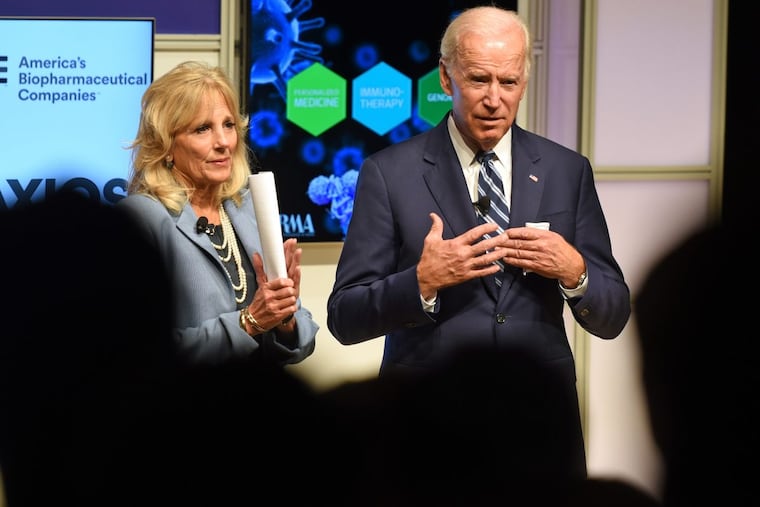Joe Biden in Philly: To cure cancer, data must be shared
It is important for patients to become informed about their cancer, to partner with their physician and to seek out other opinions, if necessary, one speaker said.

Former Vice President Joe Biden got right to the point: To cure cancer, academics, scientists, pharmaceutical companies and other business leaders must share information and data.
"The more data we can accumulate … the quicker we can get a solution," Biden said. There was a lot that could be done to break down the silos that exist between various sectors and prevent the flow of information, he said.
Biden was a featured panelist at a discussion on the future of cancer treatment — and what it will take to accelerate improvements — held at the National Constitution Center on Wednesday and sponsored by the news website Axios.
Joining Biden was his wife, Dr. Jill Biden, the co-chair of the Biden Cancer Initiative; Mark Alles, CEO of the pharmaceutical company Celgene Corp.; Stefanie Joho, a cancer survivor and writer; Elizabeth Jaffee, deputy director of the Sidney Kimmel Cancer Center at Johns Hopkins University; and internet mogul Sean Parker, founder of the Parker Institute for Cancer Immunotherapy.
In 2015, Joe Biden's son Beau died at 46 after a two-year battle with brain cancer. The following year, President Obama asked Biden to head the Cancer Moonshot project to speed the search for cures.
"We were hoping the science would outrun the disease," Biden said of his son's cancer.
Cancer, he said, is a bipartisan fight.
When President Trump threatened to cut $10 billion in funding to the National Institutes of Health, Congress restored the money and added $2 billion more, he said.
Five years ago, Biden said, he pushed for improvements to the ClinicalTrials.gov website, a database of public and privately funded clinical studies.
That came just in time for Joho, who was told in the summer of 2014 she was out of options to treat her Stage IV colon cancer. Her weight was down to 100 pounds, she was taking powerful drugs for debilitating back pain, and hospice was on the horizon, she told the packed crowd.
Her younger sister scoured ClinicalTrials.gov and found a match at Hopkins. Twenty-four hours later, Joho was in touch with a doctor who was using immunotherapy to treat the type of cancer she had.
"I don't think the general public knows how quickly things are changing," said Joho. It is important for patients to become informed about their cancer, to partner with their physician and to seek out opinions, she said.
"I would not be here today if I listened to one doctor," said Joho. "It is your life, you have to take control."
Elizabeth Jaffee, who is also the president-elect of the American Association for Cancer Research in Philadelphia, said as a physician she, too, is concerned that many patients are not aware of how clinical trials might help them.
"It is so much easier to treat an involved patient," Jaffee said.
Despite the talk of bipartisanship, Joe and Jill Biden were wearing blue to celebrate the Democratic Party's wins around the country on Election Day.
"We had a good night," said Joe Biden.
When asked for his take on President Trump, Biden didn't hold back on connecting him with disturbing recent events.
"This has gotten so coarse, so vile, so demeaning, and our children are watching," he said.
He spoke of the racist and antisemitic slogans on signs carried by white supremacists at recent marches.
"Folks, this is eating at the fabric of our country," Biden said. "It is wrong."